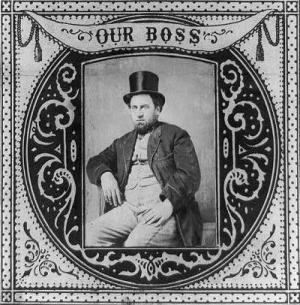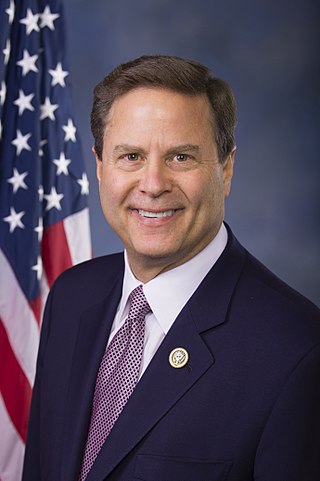Related Research Articles

In the United States, politics function within a framework of a constitutional federal republic and presidential system, with three distinct branches that share powers: the U.S. Congress which forms the legislative branch, a bicameral legislative body comprising the House of Representatives and the Senate; the executive branch, which is headed by the president of the United States, who serves as the country's head of state and government; and the judicial branch, composed of the Supreme Court and lower federal courts, and which exercises judicial power.

First-past-the-post voting is an electoral system wherein voters cast a vote for a single candidate, and the candidate with the most votes wins the election. Analogous systems for multi-winner contests are known as plurality block voting or "block voting" systems; both FPTP and block voting are "plurality" systems in that the winner needs only a plurality of the votes and not an absolute majority. The term first-past-the-post is a metaphor from horse racing of the plurality-voted candidate winning such a race; the electoral system is formally called single-member plurality voting (SMP) when used in single-member districts, and informally called choose-one voting in contrast to ranked voting or score voting.
George E. Norcross III is an American businessman and a Democratic Party organizer and power broker in southern New Jersey.
Majority rule is the principle that the group that has the most supporters gets its way. A majority is more than half of the voters involved, and rule by such a majority is thought to be to the benefit of more than rule by less than half would be. Majority rule is the binary decision rule most often used in decision-making bodies, including many legislatures of democratic nations. Where no one party wins a majority of the seats in a legislature, the majority of legislators that wields power is partly composed of members of other parties in support.

In the politics of the United States, elections are held for government officials at the federal, state, and local levels. At the federal level, the nation's head of state, the president, is elected indirectly by the people of each state, through an Electoral College. Today, these electors almost always vote with the popular vote of their state. All members of the federal legislature, the Congress, are directly elected by the people of each state. There are many elected offices at state level, each state having at least an elective governor and legislature. There are also elected offices at the local level, in counties, cities, towns, townships, boroughs, and villages; as well as for special districts and school districts which may transcend county and municipal boundaries.

Stephen M. Sweeney is an American politician and labor leader who served in the New Jersey Senate from 2002 to 2022, representing the 3rd legislative district. A member of the Democratic Party, he was the 114th President of the New Jersey Senate from 2010 to 2022 and served as the body's majority leader from 2008 to 2010.

In politics, a boss is a person who controls a faction or local branch of a political party. They do not necessarily hold public office themselves; most historical bosses did not, at least during the times of their greatest influence. Numerous officeholders in that unit are subordinate to the single boss in party affairs. Bosses may base their power on the support of numerous voters, usually organized voting blocs, and manage a coalition of these blocs and various other stakeholders. When the party wins, they typically control appointments in their unit, and have a voice at the higher levels. Reformers typically allege that political bosses are corrupt. This corruption is usually tied to patronage: the exchange of jobs, lucrative contracts and other political favors for votes, campaign contributions and sometimes outright bribes.

"One man, one vote", or "one person, one vote", expresses the principle of equal representation in voting. This slogan is used by advocates of democracy and political equality, especially with regard to electoral reforms like universal suffrage and proportional representation.

General elections in Singapore must be held within three months after five years have elapsed from the date of the first sitting of a particular Parliament of Singapore, as per the Constitution. However, Parliament can also be dissolved and a general election called at the behest of the Prime Minister before the five-year period elapses. The number of constituencies or electoral divisions is not permanently fixed by law, but is declared by the Prime Minister prior to each general election pursuant to the Parliamentary Elections Act, which governs the conduct of elections to Parliament, taking into account recommendations of the Electoral Boundaries Review Committee.
Apportionment is the process by which seats in a legislative body are distributed among administrative divisions, such as states or parties, entitled to representation. This page presents the general principles and issues related to apportionment. The page Apportionment by country describes specific practices used around the world. The page Mathematics of apportionment describes mathematical formulations and properties of apportionment rules.
Joseph Guerino Tripodi born 25 November 1967), a former Australian politician, was a member of the New South Wales Legislative Assembly representing the electorate of Fairfield for the Labor Party between 1995 and 2011. He was Minister for Finance, Infrastructure, Regulatory Reform, Ports and Waterways under former Premier Nathan Rees. He was a controversial figure during his time in politics, known as a factional boss, within the NSW Labor Right whose Terrigals sub-faction has twice dumped the sitting Labor Premier during 2007 and 2010. On 11 November 2010, he announced his decision to not contest the 2011 state election. Tripodi had his membership of the Labor Party terminated in June 2014 after the NSW Independent Commission Against Corruption (ICAC) found that Tripodi acted in corrupt conduct by deliberately failing to disclose to his Cabinet colleagues his awareness of the Obeid family's financial interests in Circular Quay leases. In 2016 ICAC made a second finding of corruption against Tripodi for leaking confidential Treasury information to benefit Nathan Tinkler's business interests, and recommended charges. In 2017 ICAC made a third finding of corruption against Tripodi for using his ministerial position to try to award a government water contract to benefit the Obeid family.
New Jersey is one of the fifty U.S. states. The state is considered a stronghold of the Democratic Party and has supported the Democratic candidate in every presidential election since 1992. Democrats have also controlled both chambers of the state legislature since 2004. New Jersey currently has two Democratic United States senators. New Jersey's Class I Senate seat has been Democratic since 1959. New Jersey's Class II Senate seat has been Democratic since 1979. In addition, New Jersey's House congressional delegation has had a Democratic majority since 1965, except for a period between 1995-1999 and 2013-2017. As of July 1, 2020, there were more registered Democrats than unaffiliated voters for the first time in history, as there are more Democrats than Republicans as well.
Ian Michael Macdonald is a former Australian politician and currently undergoing court proceedings and was a member of the New South Wales Legislative Council from 1988 to 2010 representing the Labor Party. Between 2003 and 2010, Macdonald held a range of ministerial responsibilities in the Carr, Iemma, Rees, and Keneally ministries. Macdonald, who joined the Labor Party in 1972, had his membership of the party terminated in 2013 for bringing the party into disrepute.
Edward Moses Obeid is a retired Australian politician, and convicted criminal, who served as a member of the New South Wales Legislative Council between 1991 and 2011, representing the Labor Party. He was the Minister for Fisheries and the Minister for Mineral Resources from 1999–2003. Prior to the March 2015 expiry of his term in the Legislative Council, Obeid announced his decision to retire early on 10 May 2011, citing family reasons.

Elections in New Jersey are authorized under Article II of the New Jersey State Constitution, which establishes elections for the governor, the lieutenant governor, and members of the New Jersey Legislature. Elections are regulated under state law, Title 19. The office of the New Jersey Secretary of State has a Division of Elections that oversees the execution of elections under state law. In addition, the New Jersey Election Law Enforcement Commission (ELEC) is responsible for administering campaign financing and lobbying disclosure.

Persons 18 years or older on the general election date were eligible to register and vote in the general election. The following offices were up for election in the United States State of New Jersey in the general election on November 3, 2009:

The election of the president and the vice president of the United States is an indirect election in which citizens of the United States who are registered to vote in one of the fifty U.S. states or in Washington, D.C., cast ballots not directly for those offices, but instead for members of the Electoral College. These electors then cast direct votes, known as electoral votes, for president, and for vice president. The candidate who receives an absolute majority of electoral votes is then elected to that office. If no candidate receives an absolute majority of the votes for president, the House of Representatives elects the president; likewise if no one receives an absolute majority of the votes for vice president, then the Senate elects the vice president.

Donald W. Norcross is an American politician and labor leader who is the U.S. representative for New Jersey's 1st congressional district in South Jersey. A member of the Democratic Party, Norcross was first elected to this congressional seat in 2014, following the resignation of Rob Andrews. His district covers much of the New Jersey side of the Philadelphia metro area, including Camden, Cherry Hill, Lindenwold, and Glassboro.
The New South Wales Labor Party, officially known as the Australian Labor Party (New South Wales Branch) and commonly referred to simply as NSW Labor, is the New South Wales branch of the Australian Labor Party (ALP). The branch is the current ruling party in the state of New South Wales and is led by Chris Minns, who has served concurrently as premier of New South Wales since 2023.
Clientelism or client politics is the exchange of goods and services for political support, often involving an implicit or explicit quid-pro-quo. It is closely related to patronage politics and vote buying. Clientelism involves an asymmetric relationship between groups of political actors described as patrons, brokers, and clients. In client politics, an organized minority or interest group benefits at the expense of the public. Client politics may have a strong interaction with the dynamics of identity politics. This is particularly common in a pluralist system, such as in the United States, where minorities can have considerable power shaping public policy. The opposite of client politics is 'entrepreneurial' politics, or conviction politics.
References
- ↑ NJ.com, Brent Johnson | NJ Advance Media for (2021-12-20). "N.J. Democratic powerbroker George Norcross now registered to vote in Florida". nj. Retrieved 2022-09-18.
- ↑ "Eddie and Moses Obeid, Ian Macdonald jailed over conspiracy".